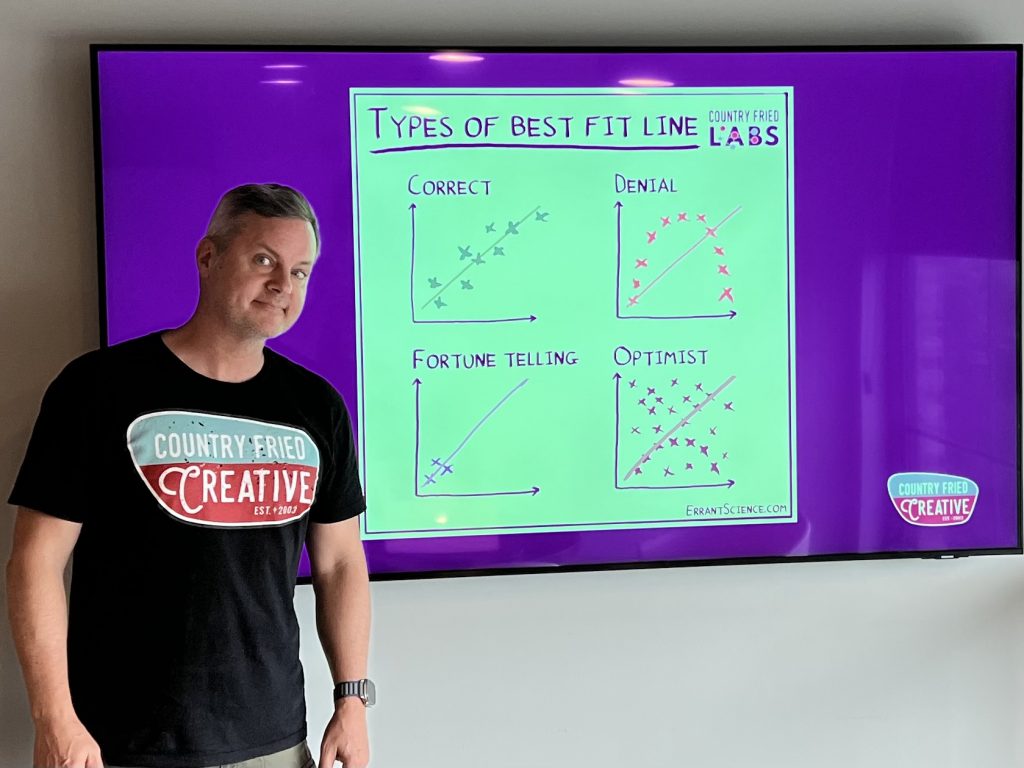Over the years, I’ve come to understand that the success or failure of both business and personal endeavors most often depends on a single factor—our relationships with people. That’s not to say it is the only factor, but it does seem to have the most influence. No amount of money, automation, expertise, or sheer willpower can fix a broken relationship. Broken relationships can derail projects, lose customers, run off good employees, start wars, end marriages, and cause all sorts of problems.
When it comes to relationships, things often fall along a spectrum between negative sentiments like blame and good feelings like praise. Whether we are assigning blame for a project’s failure or giving praise for a job well done, these actions shape our relationships and can significantly impact the success of our business and personal lives. NOTE: I am not a psychologist, so this article is just my personal opinion and should not be construed as professional medical advice.
If you’ve read some of my previous articles, you know that I have a background in math and science. We regularly apply data science principles to the work we do at my marketing agency. Most of our staff do creative work, and they excel at that. Since their work is done in a business context, that creativity is applied to helping clients reach their marketing goals. In order to be effective, we apply data science and analytics to measure, assess, and even predict marketing results.
You can have the most creative marketing campaign in the world, but if no one sees it, then that campaign is not likely to succeed. What if we apply some of those same principles to relationships? Both marketing and relationships deal with people. All too often, good intentions, like great creativity, don’t necessarily translate to better results or better relationships. So indulge me a moment while I assume the role of a data scientist to explore some characteristics of business and personal relationships.
Like any good scientist, I’m going to start by defining some key terms. These terms could apply to people or non-corporeal entities, but we’re going to focus on people:
• Relationship: The way in which two or more people are connected, interact, and affect each other.
• Blame: The act of holding someone responsible for a fault or wrong.
• Praise: The act of expressing approval or admiration for someone’s actions or achievements.
• Attribution: The process of determining the cause or reason behind an outcome or event.
• Agents: The individuals or entities involved in actions or events, often the subjects of attribution.
In both business and personal contexts, the way we assign blame and praise plays a crucial role in shaping our relationships and interactions. All too often, people fall victim to personal biases, stereotypes, and even media influences to falsely blame or praise others. Misattributions like that are normally done as an emotional response with very little thinking involved. By understanding these dynamics with an open heart and open mind, we can foster healthier and more productive connections. Now, let’s delve deeper into the key characteristics of relationships using data science to better understand other people:
Key Characteristics of Relationships from a Data Science Perspective
Direction: Simply put, a relationship tends to either be a positive one or a negative one often fluctuating between the two directions.
• Positive Relationship: When we give praise, we often see positive outcomes such as increased motivation and improved performance. For example, acknowledging an employee’s hard work can boost their morale and productivity. Of course, falsely giving praise can backfire and be misinterpreted as insincerity.
• Negative Relationship (Inverse): Assigning blame can lead to negative outcomes such as decreased trust and lower morale. For instance, blaming a team member for a project’s failure can result in resentment and reduced collaboration. Yet, there are times when a failure needs to be acknowledged so that improvement can occur.
Magnitude (Strength): The impact of blame and praise can vary in intensity. Strong attribution of praise can lead to significant improvements in relationships and performance, while strong attribution of blame can cause severe damage to trust and cooperation.
Form: Imagine for a moment that we were graphing a relationship on a standard cartesian plane (aka “x/y graph”).
• Linear Relationship: Consistent recognition of effort (praise) can steadily improve performance over time. Such a graph would should a consistent rate of improvement.
• Non-linear Relationship: Blame may have a more complex relationship, where occasional blame might not have a significant impact, but repeated blame can exponentially harm relationships and performance.

The author explaining some humorous examples of best fit lines on an x/y graph. Photo/Sophie Castellon
Causality: Directly attributing success to an individual’s actions (praise) can encourage continued positive behavior. Conversely, directly attributing failure to someone’s actions (blame) can discourage and demotivate them.
Association: Understanding the context and factors associated with outcomes can help in fair attribution. For instance, recognizing external factors that contributed to a project’s failure can prevent unfair blame and foster a more supportive environment.
Direction of Influence:
• Unidirectional Relationship: Sometimes, praise or blame might flow in one direction, such as from a manager to an employee. In general, this isn’t a good model for long-term success in a relationship.
• Bidirectional Relationship: In healthy relationships, both business and personal, there’s often a two-way street of giving and receiving praise and blame, which helps in maintaining balance and mutual respect.
Consistency: Fair and consistent attribution of praise and blame builds trust and reliability in relationships. Inconsistent attribution, on the other hand, can lead to confusion and distrust. This can be hard to do, and some people have long memories and “keep score.” It’s been my experience that consistency is one of the most important relationship characteristics. Blaming other people has never been one of my strong suits, although some people excel at blaming others for everything.
Temporal Precedence: I really just wanted to use that word – temporal, which simply means something is related to time. Ensuring that attributions of blame or praise are timely can make them more meaningful and effective. Immediate recognition or constructive feedback tends to have a greater impact. In other words, try to acknowledge the situation as quickly as possible and don’t save it up for later.
Leadership and the Role of Blame and Praise
Leadership plays a critical role in how blame and praise are managed within a business. Effective leaders understand the importance of taking responsibility for failures and assigning praise to others for successes. This approach not only builds trust but also fosters a positive and productive work environment. Unfortunately, many leaders have forgotten how to do this. Here’s three things to consider in that regard.
1. Leaders and Blame: Good leaders are quick to take blame when things go wrong. This shows accountability and protects the team from undue criticism. It also encourages a culture of learning from mistakes rather than fear of retribution. By taking blame, leaders can redirect the focus towards finding solutions and improving processes, rather than getting bogged down in fault-finding.
2. Leaders and Praise: Effective leaders generously ascribe praise to their team members. Recognizing and celebrating individual and team achievements boosts morale and motivation. This does not mean “everyone is a winner”. Quite often, there is a single winner in a contest or competition. Assigning praise where it’s due reinforces positive behaviors and encourages a culture of appreciation and recognition.
3. Avoiding Toxicity: Leaders must be vigilant against toxic behaviors, such as individuals who constantly blame others or look for causation where none exists. These behaviors can undermine trust and collaboration within the team. Addressing and mitigating toxic behaviors promptly helps maintain a healthy and supportive work environment. This is one of my biggest pet peeves in dealing with people – the Schleprocks and Eyeores of the world who are always negative about everything.
Relating This Back to Relationships
In business, understanding how we assign blame and praise can transform team dynamics and performance. By giving praise where it’s due and fairly attributing blame, we foster a culture of accountability and appreciation. This not only enhances individual motivation but also strengthens team cohesion. In my company, we try to do that with regular team recognitions. On a daily basis, this happens in our company group chat. On a monthly basis, this happens at our all-hands team meeting.
In our personal lives, the principles are similar. Recognizing and appreciating the efforts of our loved ones while being mindful of how we assign blame can improve our relationships. Constructive feedback, combined with genuine appreciation, can build a foundation of trust and mutual respect. In many ways, this is harder to manage at home than it is in the workplace. In a previous article, we examined the five love languages, and you might find some good tips about how to enhance relationships in that article.
Final Thoughts
Ultimately, the way we manage blame and praise in our relationships will have a direct impact on the probability of success or failure in your endeavors. By focusing on fair attribution and recognizing the positive contributions of others, we can create an environment where everyone feels valued and motivated. This approach not only drives success in business but also nurtures healthier, happier personal relationships. The key is to balance blame and praise thoughtfully, fostering a culture of growth, appreciation, and mutual support.
I would encourage you to take a closer look at how you assign blame and praise in your daily interactions. Using key concepts from data science that we explored earlier in this article can help provide a framework for managing your relationships. Reflect on your personal and professional relationships, and consider how fair attribution can make a difference. Start by giving genuine praise where it’s due and taking responsibility when things go wrong. Encourage a culture of constructive feedback and appreciation, both at work and at home. By doing so, you can contribute to building stronger, more positive relationships that benefit everyone involved.
[Joe Domaleski, a Fayette County resident for 25+ years, is the owner of Country Fried Creative – an award-winning digital marketing agency located in Peachtree City. His company was the Fayette Chamber’s 2021 Small Business of the Year. Joe is a husband, father of three grown children, and proud Army veteran. He has an MBA from Georgia State University and enjoys sharing his perspectives drawing from thirty years of business leadership experience. Joe is a recipient of the Peachtree City Rotary Club Business Leader of the Year Award for 2024. Sign up for the Country Fried Creative newsletter to get marketing and business articles directly in your inbox. You can connect with Joe directly on LinkedIn for more insights and updates.]
